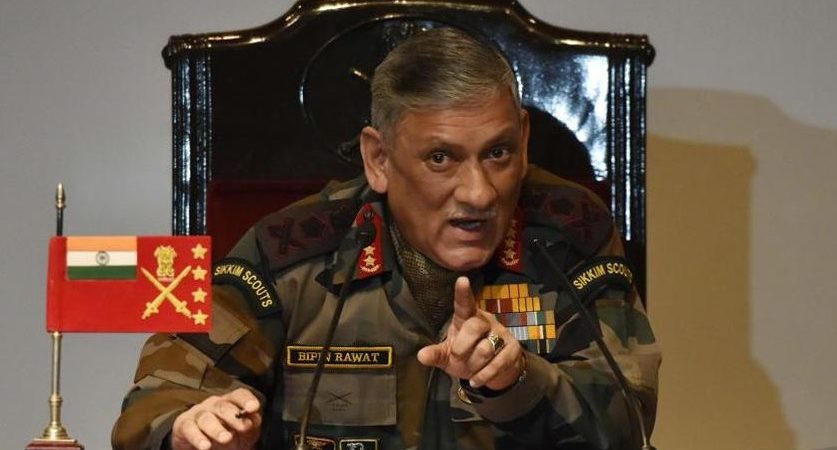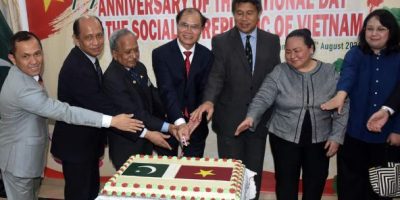Indian Army not expecting ‘limited war’ with Pakistan

NEW DELHI, MAY 29 (DNA) – India Army chief General Bipin Rawat has said that the Indian Army is facing a ‘dirty war’ in (Indian-held) Jammu Kashmir, which has to be fought with ‘innovative’ ways.
“This is a proxy war and proxy war is a dirty war and it is played in a dirty way. The rules of engagements are there when the adversary comes face-to-face and fights with you. It is a dirty war… That is where innovation comes in. You fight a dirty war with innovations,” he said.
He said that the main objective of awarding Major Leetul Gogoi, when a court of inquiry was finalising its probe into the incident, was to boost the ‘morale’ of young officers who were operating in a very difficult environment in the militancy-infested state. The army chief’s commendation medal to Major Gogoi who had tied a Kashmiri to an army jeep and used him as a human shield last month was criticised by rights activists, and by former army generals.
A video of the incident had triggered a row with many condemning it. Farooq Dar, who was tied to the jeep, said he was not a militant or a stone-thrower, and was only returning home after casting his vote in the by-election when he was hauled away. He said that he still suffered from physical and mental trauma after being paraded on the jeep’s bonnet with a sign slung around his neck, warning stone-pelters of the consequences.
“People are throwing stones at us, people are throwing petrol bombs at us. If my men ask me what do we do, should I say, just wait and die? I will come with a nice coffin with a national flag and I will send your bodies home with honour. Is it what I am supposed to tell them as chief?” General Rawat said. “I have to maintain the ‘morale’ of my troops who are operating there (in Kashmir),” he said.
About the complexity of the security challenge in the disputed state, he suggested it would have been easier for the armed forces if the protesters were firing weapons instead of throwing stones. “In fact, I wish these people, instead of throwing stones at us, were firing weapons at us. Then I would have been happy. Then I could do what I want to do,” he said.
He also said that if people in any country lose fear of the army, then the country was doomed. “Adversaries must be afraid of you and at the same time your people must be afraid of you. We are a ‘friendly’ army, but when we are called to restore law and order, people have to be afraid of us,” he said, and asserted that ‘maximum restraint’ was being maintained while handling the situation in the disputed state.
The Indian army chief claimed that ‘just’ four districts of South Kashmir were ‘disturbed’ and it was incorrect to say that entire Kashmir has gone out of control. “It will have to be a composite solution. Everybody will have to get involved. Army’s role is to ensure that violence does not take place and the common man who is not indulging in this violence is protected,” he said, when asked about the solution to the Kashmir issue.
To a separate question, General Rawat said that he does not anticipate a limited war with Pakistan. Recently, Chief of Army Staff General Qamar Javed Bajwa had expressed complete satisfaction over the operational readiness of the Pakistan Army. “Our armed forces are fully prepared to respond to the entire spectrum of direct and indirect threats,” he had said.
“Pakistan’s armed forces together with our resilient nation have surmounted every challenge and will thwart any sinister design against the integrity and sovereignty of Pakistan in future as well,” General Bajwa had said. Adviser on Foreign Affairs Sartaj Aziz also pointed out that it needs to be understood that the situation in the Indian-held Kashmir was not of Pakistan’s making but a direct consequence of illegal Indian occupation and a long history of atrocities that has resulted in several deaths.
Pakistan has urged the international community to come to the aid of Kashmiris facing massive human rights violations at the hands of Indian armed forces. Jammu Kashmir is an international issue which was recognised as such by a number of UN Security Council resolutions. Can India deny there are over 700,000 military and paramilitary forces deployed in the disputed state, which amounts to a shocking ratio of one military person to 70 civilians?
Related News

Magnolia Chapter of FASP hosts AGM with stunning floral art demonstration
ISLAMABAD, AUG 31 /DNA/ – Serena Hotel, Islamabad. The meeting started with the recitation ofRead More

Vietnam celebrates 79th national day
ISLAMABAD, AUG 31 /DNA/ – Ambassador of Socialist Republic of Vietnam Pham Anh Tuan theRead More


Comments are Closed